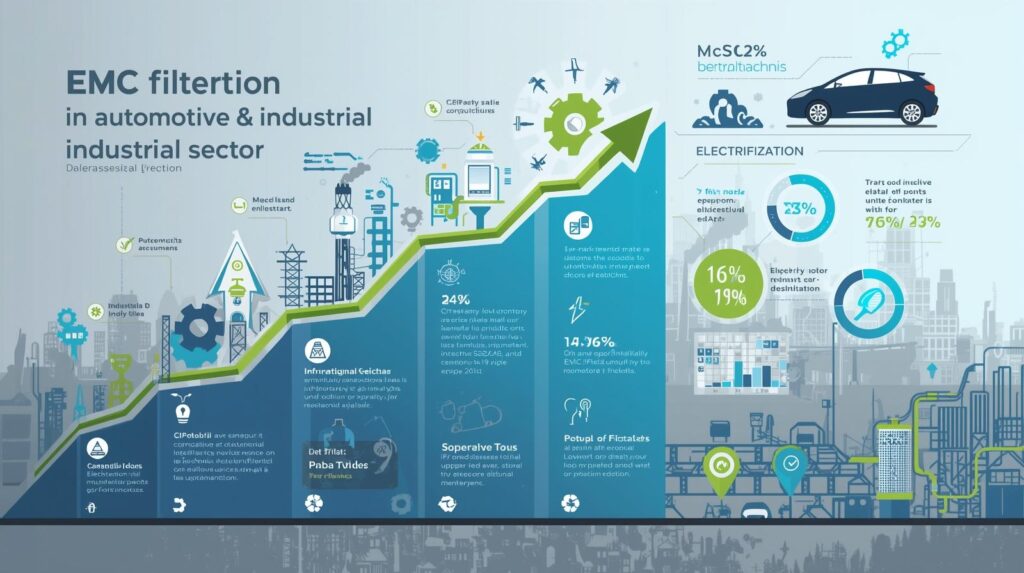As the world steadily shifts toward electrification, both the automotive and industrial sectors are undergoing rapid transformation. Alongside this technological evolution, a critical yet often overlooked component is quietly experiencing a surge in demand — the EMC filtration market.
From electric vehicles to automated factory floors, electromagnetic compatibility (EMC) is becoming increasingly essential to ensure safe, reliable, and interference-free operation. As a result, EMC filtration market growth is closely mirroring the pace of innovation in these industries.
Why EMC Filtration Matters in Electrification
Electromagnetic interference (EMI) can disrupt sensitive electronics, leading to malfunctions or safety risks. EMC filters — which suppress or eliminate EMI — are crucial in ensuring electronic systems function as intended, particularly in high-stakes environments like electric vehicles (EVs) and industrial automation.
With EVs, for example, high-voltage components such as inverters, motors, and onboard chargers generate significant electrical noise. Without proper EMC filtration, this noise can interfere with everything from navigation systems to battery management. Likewise, in industrial settings, as factories adopt smart automation and robotics, the potential for electromagnetic interference rises — and so does the need for robust EMC solutions.
This growing dependence on electronic systems has directly fueled EMC filtration market growth, turning what was once a niche segment into a foundational technology.
Automotive Electrification: A Key Driver
One of the most significant contributors to EMC filtration market growth is the global transition to electric mobility. Automakers are investing heavily in electrification, and each EV on the road requires multiple EMC filters to meet regulatory standards and ensure operational reliability.
In addition to passenger vehicles, electric buses, trucks, and even two-wheelers are joining the electrification wave, further expanding the addressable market for EMC filtration providers. As EV production scales, demand for high-performance, compact, and cost-effective EMC solutions will continue to rise.
Download PDF Brochure @ https://www.marketsandmarkets.com/pdfdownloadNew.asp?id=172300360

Industrial Automation and Industry 4.0
In parallel, the industrial sector is undergoing its own revolution. Smart factories, driven by Industry 4.0 principles, are becoming data-rich environments filled with sensors, programmable logic controllers (PLCs), and wireless communication systems — all vulnerable to EMI.
To keep operations running smoothly, manufacturers are increasingly integrating EMC filters into their systems. This proactive approach not only prevents costly downtime but also ensures compliance with international standards. It’s another solid pillar supporting EMC filtration market growth.
Regulatory Compliance Driving Adoption
Another factor accelerating EMC filtration market growth is the tightening of global EMC regulations. Whether it’s the European Union’s EMC Directive or international automotive standards, compliance is non-negotiable. OEMs and equipment manufacturers are recognizing the value of investing in EMC solutions early in the design process to avoid costly revisions and ensure product certification.
Innovation and Future Outlook
As demand increases, innovation in EMC technology is keeping pace. Manufacturers are developing compact, high-efficiency filters capable of handling higher frequencies and harsher environments. The integration of EMC filtration into modular designs and custom systems is also helping meet the unique requirements of modern electrified applications.
Looking ahead, EMC filtration market growth is expected to remain strong, fueled by the accelerating pace of electrification, digitalization, and automation. Emerging applications such as electric aircraft, autonomous vehicles, and next-gen robotics will only expand the landscape further.
Final Thoughts
In many ways, the story of the EMC filtration market growth mirrors the broader narrative of technological advancement. As industries embrace electrification and automation, EMC filtration is stepping out of the shadows and into the spotlight — proving itself as an essential building block of our electrified future.
Whether it’s enabling cleaner mobility or smarter manufacturing, EMC filters are quietly ensuring that the devices and systems powering tomorrow’s world can communicate, operate, and thrive — without interference.
Frequently Asked Questions (FAQ) – EMC Filtration Market Growth
1. What is EMC filtration, and why is it important?
EMC (Electromagnetic Compatibility) filtration involves the use of filters to suppress or eliminate electromagnetic interference (EMI) from electrical systems. It’s essential in ensuring electronic devices operate without disrupting or being disrupted by other equipment — especially in complex environments like electric vehicles and automated factories.
2. What is driving EMC filtration market growth?
- The primary drivers include:
- Electrification of vehicles (EVs, buses, trucks, etc.)
- Industrial automation and smart manufacturing
- Increasing adoption of high-frequency electronics
- Stricter global EMC regulations and compliance requirements
These trends are fueling demand for effective EMC solutions, leading to strong EMC filtration market growth.
3. How does the rise of electric vehicles impact the EMC filtration market?
Electric vehicles contain high-voltage components like motors, inverters, and chargers, all of which generate EMI. To prevent system failures and ensure safety, multiple EMC filters are required. The booming EV market is, therefore, a significant driver of EMC filtration market growth.
4. Which industries are seeing the most EMC filtration adoption?
Key sectors include:
- Automotive (especially electric and hybrid vehicles)
- Industrial manufacturing
- Energy and power systems
- Aerospace and defense
- Consumer electronics
With the rise of Industry 4.0 and electrification, these industries increasingly rely on EMC filtration.